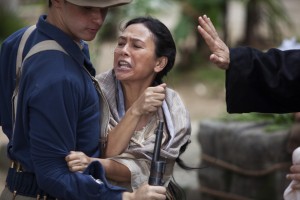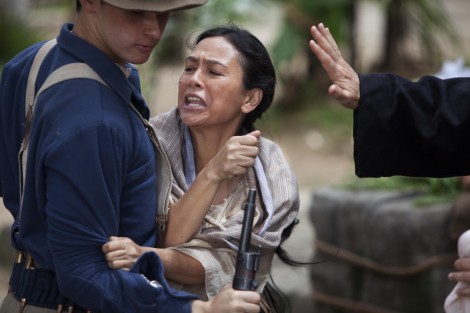‘Amigo’ tells the untold story of the Philippine-American War

John Sayles is a prolific writer-director who has made several important films. From Sunshine State to Passion Fish, the man can create cinema that resonates beyond the closing credits. Heck, I’d even throw in Alligator and Piranha as enjoyable distractions.
His latest work is Amigo, a small film that tries to tell a big story. Although there are glimmers of potential, much of the movie is an unfortunate slog with uninteresting characters played by so-so actors. This doesn’t deny the fact that the story behind Amigo is a crucial one, especially for American audiences.
The Philippine-American War is often glazed over in the history books, but Sayles’ thesis makes the point that the episode should be studied and never forgotten. The director finds the lesson behind the conflict. There are many scenes throughout the movie — including waterboarding, rebel fighters in caves and excessive religiosity — that call to mind America’s present-day foreign entanglements.
If only Amigo’s storyline and characters could match that excellence, then the movie would be remembered along with the best historical fictions of the year.
Joel Torre plays Rafael, the mayor of a rural village in the Philippine countryside, which has been under Spanish rule and now handed over to the Americans. Conditions for the rice farmers have been difficult.
Rafael and the townsfolk are essentially prisoners in their own houses. They are allowed to work, but are given definitive boundaries on where they’re allowed to roam. American soldiers, headed by Col. Hardacre (Chris Cooper) and Lt. Compton (Garret Dillahunt), play de-facto police officers, keeping the peace and trying to get information about the rebels in the jungle.
One of those “freedom fighters” is Rafael’s brother, Simon (Ronnie Lazaro), who leads a small, but deadly contingent of men. They make life for the occupying Americans as difficult as possible; whether it’s cutting radio lines or passing secret messages to the villagers, they are determined to regain their country.
Thrown into the melee is a Catholic priest (Yul Vazquez) leftover from Spain’s colonial rule. Although he offers the local Christians a chance to forgive their sins, he also proves to be as harsh as the Americans. His robes are as disconcerting to the locals as the blue uniforms and khaki pants of the Americans.
The dialogue is in English, Tagalog and Spanish, with several scenes constructed around the inability of each character to translate what the others are saying. That feeling of disconnect is one that persists throughout the film. Nothing seems tied together, and Sayles is unable to gather enough emotion to make Rafael’s plight effectively resonant.
The acting is surprisingly wooden. Everyone seems to stand for something and never feels like a true character. Dillahunt and Cooper play one of the oldest military clichés in the book: the good officer and the bad officer. It’s been seen in countless movies — everything from Full Metal Jacket to Platoon — and these two characters don’t add much to the cinematic dichotomy.
Torre does an admirable job as Rafael, although he seems 10 times as smart as any of the occupying forces. It’s almost a mystery how the village could come under the rule of these bumbling drunkards.
Except for Rafael, many of the villagers lack uniqueness. They work; they pray; they cry. The movie oddly keeps the village at an arm’s length. We learn more about the Americans, while we should be caring for this community.
Amigo, like many “message” films, falls victim to its self-awareness. When a filmmaker wants to convey a particular political stance or historical viewpoint, sometimes characters become archetypes, rather than real people.
Still, there are some scenes that register with the audience. Gil (Dane DeHaan) is a young recruit who falls for a local girl. The sweet storyline shows that even in times of war and occupation, it doesn’t matter what side you’re on.
It’s a fitting reminder that Sayles has made a commendable film, just not a very good one.
By John Soltes / Publisher / John@HollywoodSoapbox.com-
Amigo
-
2011
-
Written and directed by John Sayles
-
Starring Joel Torre, Chris Cooper, Garret Dillahunt and Yul Vazquez
-
Running time: 124 minutes
-
Unrated
-
Rating:




-
Click here for more information on Amigo.

